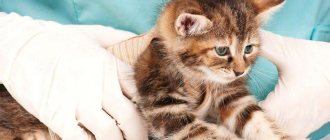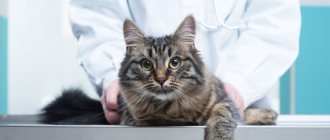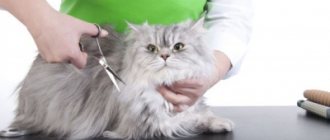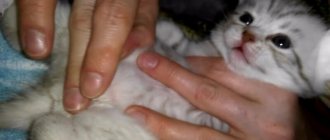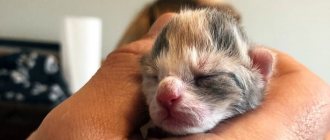After kittens appear in the house, the owner will immediately think about where to give these cute fluffy balls. However, an equally important point will be not only the place where the kittens will end up, but also the age at which they will be separated from the mother cat. In this article we will tell you when you can give away kittens, what age is optimal and why. You will also learn what exceptions exist and the negative consequences of premature separation from the mother.
Kittens are ready for independent living only at a certain age.
At what age can you buy a kitten and sell kittens: expert advice
Bought a kitten
Often people persistently want to buy a tiny kitten that is barely a month old. Moreover, there is no shortage of advertisements from breeders who want to sell animals at such a young age.
There is an opinion that an older kitten will not form an attachment to its owner. This common misconception is fraught with dire consequences. Read the article on our website about how a kitten develops week by week , and you will understand why it is forbidden to take a little fluffy from its mother.
At what age can you buy a kitten and sell kittens? Experienced veterinarians are categorical on this matter. Here are the experts' advice:
- Don't complicate your life by caring for a kitten whose age has not reached 12 weeks.
- Younger creatures are very small and depend on their mother for everything.
- A three-month-old kitten may seem too old for those who would like to buy a funny little one and watch its development. But for a baby, this is the age when he will feel comfortable in a new place.
- Also, damage to the kitten’s well-being can be caused by tearing it away from its mother until the required time. Parting with a nurse and a familiar environment provokes anxiety and stress in the baby, which immediately affects health.
- In the worst case scenario, the kitten can become seriously ill and even die.
If you still have doubts and want to adopt a baby, then study the advantages of buying grown-up three-month-old kittens:
- Most babies at this age already stop drinking mother's milk and make do with regular solid foods.
- The course of preventive vaccinations prescribed for kittens is behind us, therefore, the immune system is adapted to changes.
- The kitten has mastered the rules of communication with relatives and animals like him.
- Fluffy is ready to meet his new home and is eager to explore the space he will soon find himself in.
Follow the advice of experts and then you will have a new furry friend at home who will be comfortable and safe in the new room.
How to give away your baby correctly?
A nursing cat has a very developed instinct for preserving offspring, so tearing all the kittens away from her at once is cruel and dangerous to health. It is better if the future owner comes to the house, sometimes picks up the baby and returns it to the mother. So, she will understand that the person does not take away the cub. The kitten also needs to get used to new smells and sensations. Therefore, babies need to be selected gradually in this way:
- They give clothes or an item from the new owner so that the kitten gets used to the foreign smell.
- The future owner should visit the baby regularly so that he gets used to the smell and touch.
- You can take the cat away from its mother for 2-3 hours so that new family members can interact with the pet.
- You should not select offspring if the cat is against it, does not give up the cubs, hisses and growls. It's better to wait a little and try again in a few days.
- When a kitten is given away to a new family for good, it is advisable to take bedding from the old room so that the baby is comfortable and has the smell of his mother nearby.
- When the last kitten is given away, everything that smells of the cubs and reminds of them is gradually taken away from the cat.
Vaccinations for kittens: age, what, first vaccination when?
Vaccinations for kittens
The first year of a kitten’s life is filled with all kinds of medical procedures. These are repeated treatments against helminths (worms), external microbes, fleas and vaccination. Veterinarians convince that vaccination is necessary, because without vaccination the body will not deal with infections, and the animal may get sick.
The first vaccination for a kitten is best done at the age of 8-10 weeks . The second injection should be given after 3-4 weeks . If all vaccines are completed, you only need to worry about getting a booster shot once a year. Here is an approximate calendar of injections, treatments and what vaccinations kittens need to receive:
- 4–6 weeks - first treatment for worms
- 6–8 weeks - second treatment for worms
- 9 weeks - first comprehensive vaccination
- 10–12 weeks - third treatment for worms
- 12–14 weeks - second complex vaccination
How to prepare a cat for vaccinations? Here are the tips:
- The main condition before the vaccine is that the animal must be given an anthelmintic drug one or two weeks before.
- There is a huge selection of them, including in the form of treats that the animal will eat with pleasure.
- Can be used in the form of drops on the fur, which will not provoke any protest and will be well tolerated by the cat.
If these conditions are not met, then after vaccination, the cat may contract an infection, and treatment will cost the owner a tidy sum of money. Look at the detailed calendar of vaccinations and treatments for kittens:
At what age is a kitten considered a kitten?
Little kitten
Cats remain playful into old age, which is why they always look cute like kittens. Often, owners do not understand when their pet will become an adult. Until what age does a kitten remain a kitten?
- Kittens begin to move like adults at two months of age.
- Six-month-old animals enter adolescence. You should be careful at this time.
- Pets exhibit behavioral characteristics with might and main: they mark space, yell, and conquer territory in fights. However, an animal that has reached sexual maturity is still considered a kitten.
- The development of a cat is completed only by one and a half years. Now there is no doubt that the pet has finally matured.
- By this time, animals acquire not only physical, but also social maturity.
However, there is no shame in an adult cat frolicking like a kitten. If a cat remains active and inquisitive in his advanced years, then this is not a reason to doubt his maturity.
Two to three months
As a rule, a two-month-old kitten is already able to cope with moving to a new family and getting to know a new environment. The baby can now be switched to natural products or dry food without significant harm to its health.
Vaccination
This age is largely a turning point due to the fact that it is between two and three months that the kitten undergoes its first vaccination.
Respectable breeders warn the buyer in advance whether the kitten requires any vaccinations and whether they have been given previously
Mandatory vaccinations include vaccinations against the following diseases:
- calcivirosis;
- panleukopenia (or plague);
- rhinotracheitis;
- rabies.
In addition to these diseases, the breeder can also include others at his discretion.
Vaccination schedule
As a rule, vaccination requires a certain age of the kitten and strict intervals between which the procedure must be repeated:
- the first “approach” is made at 8 weeks or two months. By this time, the kitten is strong enough to undergo vaccination without weakening. At this age, the kitten is vaccinated against all the diseases mentioned above, except for rabies;
- at four months the kitten goes through all the same vaccines again, now including rabies;
- at five months the same vaccinations are repeated as at four months.
Vaccination schedule for kittens from birth to one year
Subsequently, the pet will need to be vaccinated annually so that the body does not have time to lose the developed immunity.
Features of vaccination
A natural question may arise: “Why can’t I take the kitten to the veterinarian for vaccination and take it home?” Of course it's possible. Moreover, some owners do exactly this, buying a kitten at two months of age.
Vaccination temporarily weakens the kitten and makes it vulnerable to various diseases.
However, when taking such a step, it is necessary to be aware of the responsibility that the future owner of the animal places on his shoulders:
- firstly, there is a high probability that when moving, a kitten that has not yet been vaccinated may become infected with some disease that will be difficult for the fragile body to fight;
- secondly, the first vaccination is often not easy for a kitten. Cubs sometimes develop complications that quickly go away with the correct response from the owner. However, it can be difficult for an inexperienced person to react correctly and take the necessary actions in a timely manner.
Sometimes kittens may develop complications after vaccinations.
Of course, a two-month-old kitten will not die in your arms if you do not provide him with proper care during vaccination, but this period is very difficult for both the animal and its owner. But ultimately, assessing risks and setting your preferences is a personal matter for everyone.
At what age are kittens measured?
Little kittens
Metrica is an officially issued birth certificate for a pet. This is a kind of identity document, like a passport for people. Only the metric contains other data that indicates its pedigree.
This document states:
- Date, month, year of birth
- Breed name
- Gender of the animal
- Pet name
- Color
- Mother's nicknames for father
- Parents' color
- Breeder's initials
- Owner's initials
- Signature and seal of the organization where the document is issued
To get a metric, the owner needs to contact a cat lovers club in any city. Before filling out the document, kittens are examined for defects. If there are none, the metrics are signed and certified with a seal. A certificate for a pet can be made at an age starting from 45 days .
At what age are kittens spayed or neutered: recommendations
Neutered kitten
The earliest age to have your pet neutered is 6 months . This is the period of puberty of the animal. The optimal age for castration of a kitten is 7-8 months . Cats grow up to 1 year and it is best to do this when the body is formed, but not completely. It is from 6 to 8 months that this is the right time to castrate or sterilize a kitten.
Worth knowing: It is undesirable to delay castration, since an older animal experiences hormonal changes in the body.
Veterinarians recommend not castrating older animals - from 8 years old , due to the possibility of poor effects of anesthesia.
Conclusion: The ideal time for castration of cats is from 6 months to 8 years.
At what age do kittens change their teeth, whiskers, and eye color?
A small kitten whose whiskers, teeth and eye color have not yet changed.
Milk teeth erupt in kittens at the age of 2 to 4 weeks.
- Somewhere in the third week, when the baby already has incisors and fangs, baby teeth begin to change to permanent ones.
- This process will be completely completed by 6-7 months .
- Read more in the article at this link , when kittens change their baby teeth, how this process occurs and how to help your baby so that it is less painless.
At what age do kittens change eye color ?
- A newborn baby's eyes do not yet have pigment, and therefore they are blue.
- The change occurs depending on the breed. A cat without a breed will have dark eyes at 1-1.5 months . In an animal with a pedigree, this process can last from 1 to 12 months.
- A cat's eye color finally changes by age 2 .
Vibrissae and tactile hairs are organs of sensitivity, inspection and tactility in a cat, which we call whiskers. They appear in infancy, then grow and change throughout the cat's life, unnoticeable to humans.
Interesting: It often happens that a mother cat gnaws off the whiskers of her children. It is not known why she does this, but the breeders are sure that this is necessary so that the stupid little tomboy does not crawl out of the nest prematurely. It will take six months for the kitten to grow new whiskers.
Consequences of early separation
Owners of future furry pets often show impatience and rush to take the little creature into the house immediately after starting complementary feeding, at the age of 1 - 1.5 months. Undoubtedly, kids are very interesting, touching, and evoke a lot of positive emotions. However, early weaning from the mother leads to negative health consequences and affects the behavior of the future adult animal. Among the unpleasant moments that owners often have to face when untimely separation of a kitten from a cat, the following should be noted:
- Digestive problems. An undeveloped enzyme system still does not digest solid food well. Cubs deprived of mother's milk do not digest adult food well, they develop diarrhea and dysbacteriosis, which often leads to death.
- Weak immunity. Mother's milk during this period, although it does not provide the growing body with nutrients, still contains a high level of protective substances. Untimely weaning leads to a weakened immune system, making kittens vulnerable to viral and bacterial infections.
- Early weaning is accompanied by a strong stress reaction of the fragile organism. The bond between the cub and the mother at the age of 1 - 1.5 months is still very strong, and the animals have a hard time with parting. Against the background of stress and a weak immune system, the risk of developing diseases increases.
- When taking home a baby who has not passed the socialization stage, owners often encounter inappropriate behavior of the future pet. The kitten shows aggression towards members of the household, does not make contact, and does not know how to play. A baby separated from its mother early cannot get along with other animals and reacts incorrectly to danger. An unpleasant moment for the owner may be the fact that the fluffy ball does not caress, but scratches, bites, attacks, tears up furniture and shits anywhere. This behavior is due to the fact that the weaning occurred too early, and the cat did not have time to teach its offspring the rules of good manners and adequate behavior in society.
At what age should kittens be bathed?
The kitten's first bath
In the first weeks of life, the kitten's hygiene is maintained by the cat herself. Therefore, during this period you should refrain from swimming. At what age should kittens be bathed?
- It is best to do this at 3-4 months , after the baby teeth have been replaced.
- This age guarantees that the body will tolerate the procedure well and that mental disorders will not occur.
Of course, you need to perform bath procedures when it is relatively warm in the house and outside. During cold weather it is better not to take risks. Read more in the article at this link , you need to bathe kittens in general, because many owners are sure that this is not necessary.
Worth knowing: You should not bathe kittens with human shampoo - it is best to purchase a special one. It would also be a good idea to check the composition - for children it is better to use a product that has natural ingredients.
Different prices for kittens: main reasons
Pet class kittens are the cheapest. The higher the category, the higher the price tag will be. The first thing included in the price is the breeder's expenses. He needs a good pair that will produce healthy offspring, the cost of which is at least 120 thousand rubles.
Next, you need to feed the kittens, provide them with proper care, prepare documents for the pedigree, and get vaccinations. You need to recoup the costs within 3-5 years, because this is the maximum period during which it is recommended to obtain offspring from a cat. It is also prohibited to allow more than 2-3 litters per year, because the animal’s body must recover after childbirth and lactation.
The price is also influenced by the nursery's reputation, class, and pedigree. People line up for popular breeders, and he can decide what price to set. The cost is often influenced by the rarity of the color or the structural features of certain parts of the body. For example, a fold-eared kitten costs more than a straight-eared one.
At what age are kittens trained to use a litter box or scratching post: recommendations
A kitten is taught to use a scratching post.
Kittens grow quickly and strive to constantly explore the world. At what age are kittens trained to use a litter box? Here is the answer :
- Kittens are trained to use the litter box from 3-4 weeks .
- If the kitten does not understand what needs to be done, you can “interest” him and lightly rustle the litter in the tray.
- As a rule, animals are smart and curious, so the baby will quickly understand what is required of him.
As for the scratching post, here are some tips and recommendations:
- It is also worth accustoming a kitten to it from a very early age, while its desire to explore the world around it is at its peak, and its claws already need a little “polishing.”
- From the age of 1-2 months, kittens are already making attempts to tear at furniture with their still weak claws.
- You can buy a scratching post during this period.
It is important to remember: The process of accustoming to a scratching post is not that simple. Therefore, in some cases, it may take a long time.
Proper kitten care
When purchasing a pet, you should take care of all accessories, including a tray, which must match the size of the animal.
In order for the cat to quickly adapt, it would be correct to purchase the following contents in advance:
- Tray. If the baby is less than 5 weeks old, you need a basin with low sides. It is better to choose a regular plastic tray; closed toilets are not suitable for babies. Wood or corn filler is suitable. Silica gel primer contains chemical impurities, so it is not suitable for children.
- Scratching post. When your baby first appears indoors, you should show him where he will sharpen his claws. You need to train it from the first days, otherwise the kitten will damage the furniture. You can make a scratching post yourself from a piece of an old rug and hang it on the wall, decorating it with movable soft pet toys.
- A bowl. You will need 3 of them - for dry and wet food, water. It is better to choose ceramic or plastic. Metallic ones can oxidize food and water.
- Sun lounger. It is better to place month-old babies in a box with woolen fabric on the bed. For older cats, a bed with low sides is suitable. Some cats choose their own resting place, so if it is safe there, you can leave it there.
- Ear and eye hygiene. Particular attention should be paid to the ears of a Scottish cat, since due to the special structure of the ears, dirt accumulates inside and bacteria develop. The baby’s hearing and vision organs are wiped with special animal products “Beafar”, “Trixie”, “Diamond Eyes”.
- Grooming. For delicate fur, a wooden comb with frequent short teeth is suitable. When an animal sheds hair, combs are purchased based on the length and thickness of the fur and undercoat.
The baby is very curious and climbs everywhere, so it is advisable to put protective plugs on the sockets and put the wires out of sight, since the kitten can touch it with its claw and get an electric shock.
At what age can a kitten be treated for fleas: wear a collar, use drops?
Kitten treated for fleas
Fleas prevent the kitten from developing normally. In addition, they carry diseases. Therefore, it is necessary to promptly begin to protect the baby from these pestering insects. At what age can a kitten be treated for fleas? Here is the answer:
- You can treat a kitten against fleas using special drops starting from 1-2 months of age .
- After all, the presence of these insects can cause significant harm to the animal even in infancy.
- Of course, the age of the pet also determines the type of product. For very young kittens, you should choose more natural, gentle products.
- Those drops that are used to treat adult cats will not work.
- You can use sprays or drops on the withers.
- As a rule, at the age of 1-2 months, kittens are treated for fleas even by the most humane owners, who believe that it is not worth “tormenting” the animal until a month.
Worth knowing: If the kitten is less than 4 weeks old and has fleas, they do not use medicines, but folk recipes - as a rule, these are natural decoctions and infusions.
Anti-flea collars are also used to control fleas. But it is worth remembering that they do not serve to eradicate existing parasites, but for prevention. if fleas are already present, then it is better to resort to medication.
Important: Carefully study the composition of the drops and choose those whose recipe contains natural ingredients. After all, the smaller the kitten, the more sensitive its body.
During the treatment, the pet should not experience discomfort from substances with a pungent, unpleasant odor, much less suffocate. Keep an eye on your baby, and if he doesn’t like something or doesn’t feel well, then you need to remove the product as soon as possible.
At what age do kittens start walking?
The kitten is already starting to walk.
From birth, kittens are absolutely helpless and are not able to move independently. But at what age do kittens begin to walk? Here is the answer:
- 5-10 days after birth, the animal’s sensory abilities increase, and it begins to develop its front legs.
- Closer to the 10th day , the kittens' eyes open, which gives them a sense of orientation in space.
- In the future, babies will continue to develop sensory abilities. Thanks to the organs of touch and hearing, the kitten will achieve the ability to navigate in space, which will contribute to confidently standing on its paws.
- Within two weeks the baby will feel confident and will even try to jump.
From this moment we can assume that the kitten actually began to walk. With practice, the ability to walk will improve, and already 20-25 days after birth, the kitten’s ability to walk will approach the skills of an adult.
Optimal age to move
Kittens are often purchased through online advertisements. Thoroughbreds are offered starting from 3 months of age. There are often offers to adopt 5-7 month old kittens. Pseudo-pedigree animals without documents of origin are sold as early as 3-4 weeks of age. Kittens from 3 weeks old are placed in “good hands” for free. Usually these are kittens from domestic and outdoor cats whose owners for some reason did not neuter.
At what age is it better to take a kitten home is an important question. Professional breeders claim that at 3-4 months the kitten is completely independent of the cat: it licks itself clean, knows the litter box, uses a scratching post following the example of its mother, eats and plays independently. The main thing is that the cat no longer feeds the kitten with her milk. The restructuring of the gastrointestinal tract was smooth and natural, the kitten switched to “adult” nutrition without stress. He is not afraid of people, plays with pleasure and cuddles up to them.
The baby, previously separated from his mother, suffers without her milk. It is difficult for him to digest industrial feed or natural food, which can lead to vomiting, diarrhea, and refusal to eat. He doesn't know how to lick himself or wash his paws. Because of this, his eyes may become sour and respiratory diseases often occur. Such a kitten is still poorly oriented in space and is not able to use the tray - it simply does not remember where it is. By relieving itself in different places, the kitten gets used to uncleanliness, and this habit is difficult to break. When a kitten has a need to sharpen its claws, it will satisfy it using the owner's sofa, wallpaper or doors, because there is no one to show it to the scratching post.
Note! It is optimal to adopt a kitten at 3-5 months: with vaccinations, treated for parasites and socialized. At older ages, kittens are usually taken from breeders
These kittens attend exhibitions from 10 weeks, receive diplomas and are prepared for an exhibition career and breeding. The cost of an exhibition animal is much higher than the price of a kitten without diplomas and titles. A kitten that is unsuitable for exhibitions and breeding is usually already neutered at this age, and breeders sell it for a low price. A neutered purebred kitten is an excellent solution for those who want a pet from healthy producers that meets breed standards, but do not plan to breed
At older ages, kittens are usually taken from breeders. These kittens attend exhibitions from 10 weeks, receive diplomas and are prepared for an exhibition career and breeding. The cost of an exhibition animal is much higher than the price of a kitten without diplomas and titles. A kitten that is unsuitable for exhibitions and breeding is usually already neutered at this age, and breeders sell it for a low price. A castrated purebred kitten is an excellent solution for those who want a pet from healthy producers that meets breed standards, but do not plan to breed.
Anti-worming medications for kittens: at what age are kittens dewormed?
Anti-worm medications for kittens
Worms for animals cause many problems with health and well-being. Therefore, they need to be removed in a timely manner, and it is better to do prevention. At what age are kittens dewormed? Answer:
- You can fight helminths as early as three weeks of age.
- However, drugs must be labeled accordingly. If there is no inscription “for kittens” , then this product can only be used at one and a half to two months.
- Kittens should not be wormed often - once every three months will be enough.
The most popular medications for kittens against worms:
- Tablets: Milbemax, Drontal, Prazitel, Dirofen. Despite the fact that the tablet form is more difficult for animals to consume. Veterinarians recommend it, since the tablets contain a higher concentration of active substances. You can crush the tablet and put the powder in the kitten's food or directly in the mouth. But then you need to give it a drink, for example, from a syringe without a needle.
- Suspension : Prasitel, Prazicide, Dirofen and Febtal combo. Convenient form for reception. In liquid form, you can give the product using a special dispenser, which is included in the package, or using the same syringe without a needle.
- Drops : Drontsit, Profender, Stronghold, Prazicide. Used as a preventive measure.
It is important to consider: How often does your kitten go outside (and whether it does), how often does it communicate with other animals. If your pet is always at home and there are no other animals in the apartment, deworming can be done less often.
Food products are also taken into account. In some cases, deworming medication is used more often than once every 3-4 months, if the animal eats offal, raw minced meat, etc. But a kitten can become infected with worms even before birth - from its mother cat. The drug should be chosen according to age and weight. As a rule, most products are available in both an “adult” version and a “children’s” version (for kittens).
Advice: Give preference to natural preparations.
Month one
Just like human children, little kittens have very poor vision in the first days of their lives. However, by the end of the first week, many changes occur: the first undercoat appears, the kittens make their first hesitant movements, and sometimes they can crawl 30 or even 50 cm towards their mother.
By the end of the second week, kittens are still sleeping a lot, but they are starting to have periods of wakefulness. The animals still walk very unsteadily, but they train every day. During this period, babies are not ready to switch to other foods, and therefore mother’s milk remains their only nutritional option. The number of meals decreases, but the need for milk volume increases.
Owners need to monitor the mother cat’s quality nutrition so that all her kittens have enough milk. Approximately on the 14-16th day after birth, the cat’s eyes open well. In addition, his hearing improves significantly. The animal can hear and respond to the purring of its mother and respond to her call.
At 3 weeks, kittens can already hear and see very well, in fact, the same as adults. Their weight is approximately 350-450 g, and the first milk teeth begin to appear. Their activity is increasing. About a third of the day is waking time. They try to jump and run, but their orientation in space is still quite poor and they can get lost if they are placed in an unknown place.
At 3 weeks, kittens begin to look outside their “house”, so they often fall out of the box. It is worth making sure that there are no dangerous objects nearby that could injure the baby.
At 4 weeks (1 month), cats need socialization. In order for an animal to grow up well-mannered, you need to be in constant contact with it: talk, stroke, play. During this period, cats put out their nails for the first time, trying to protect themselves from people or falling or unfamiliar objects. The animal becomes very curious and plays a lot. This is a great time to teach your baby to use the litter box.
Veterinarians strictly prohibit separating the kitten from its mother during this period. He still really needs breast milk, because it is the most balanced for this period of development. Separation from the mother causes a strong psychological shock for the animal, which in turn provokes various digestive disorders and a sharp decrease in the immune system. A one-month-old kitten, left without a mother, begins to suffer from viral diseases.
Until what age does a cat take care of a kitten: facts
The cat takes care of the kitten
Kittens, like any children, are always very dependent on their mother, but at some point, they still need to become independent. Until what age does a cat take care of a kitten?
- During the time when babies are socializing ( from 1 to 3 weeks ), they develop a sense of family connection. They understand that they need to repeat everything after their mother, but there are also people with whom it is also interesting and fun.
- Also at this time, the role of the cat increases not only as a mother, but as a teacher and mentor.
- Using games and communication, the mother builds the behavior of her children and teaches them to hunt.
In the subsequent stage of socialization, from approximately 3 to 8 weeks , the final formation of self-care skills and the instillation of cleanliness occurs. Although the kittens may seem to be on their own, separating kittens from their mother is not the best option.
Worth knowing: Closer to 12-16 weeks, kittens become much more independent, and the cat stops taking care of them, and this is already a proven fact by many owners of these cute animals.
What socialization skills are desirable for trouble-free adaptation to new conditions?
Physiological indicators are, of course, of great importance for independent living. In a cat family, while playing with its brothers and sisters, the kitten strengthens its muscles, learns to control its body, and acquires fighting and defense skills. Mother teaches kittens to hunt.
The mother will also teach the kitten to hunt
But socialization skills are no less important, because the baby will live with people in the future. The mother also teaches this to the kitten; the baby repeats after her what she does. A cat that lives with people teaches kittens how to communicate with humans and accustoms babies to the litter box.
When my cat’s kittens grew a little older and it was time for the first feeding, I fed them separately, since the diet and consistency of the food was different from what I gave to adult cats (I had three of them). But the time has come to bring the kids “to the common table.” Usually, when I go out with food, the cats are already waiting for me at the door, lined up in a row (there’s no other way to say it), and then they all run together to the place where I give them food. I noticed that at first the kittens were minding their own business at this time, and in order for them to eat, I had to pick each one up and carry them to the “common table.” But after a week there was no longer any need to do this. They joined the general ranks and, with loud meows, caught up with their older relatives (or even ran ahead of everyone).
Kittens that grow up with their mother in a “human” family are not afraid of people, do not run away when they hear a person’s steps, and are calm when they are picked up or stroked. In all these moments they also follow the example of their mother.
One day I picked up a kitten from the street. He looked about a month and a half old. I don’t know where and how long he wandered before this. I was able to pick him up only because he was simply exhausted. This baby, after warming up and eating a little, crawled under the bed into an inaccessible corner. It took me almost a month to accustom him to myself a little. The concept of “tray” was not in his vocabulary; the best I could do was teach him to use a disposable diaper placed in his favorite place. In general, when he got used to it a little, he went to live in the yard with the rest of my pets, but he never joined the general “flock”. He found a place for himself in the barn and came only at feeding time. Apparently, this was the “child” of a street cat, who was also left without a mother at an early age, which left an imprint on his behavior and attitude towards people.
At what age can a kitten’s claws be trimmed: recommendations
Kitten's nails are trimmed
Long nails are a nuisance to any pet. In addition, they can break, damaging the tip of the paw, and this is already dangerous, since an infection can get inside the body. At what age can a kitten's nails be trimmed? Answer:
- This can be done starting from 4 months . At this time, they are already beginning to interfere with the cat’s ability to run and move actively.
- The formation of claws begins much earlier - from 4-8 weeks of life , and if there is a possibility that the cub may be injured due to the length of its claws, you can begin the procedure much earlier than the deadline.
- At a younger age, kittens' claws are fragile, so they do not cause significant harm, but they can interfere and injure the paws if the animal accidentally gets caught on something.
Of course, you should also pay attention to how quickly the claws grow. After all, some animals' claws grow faster, while others grow slower. It is best to trim once or twice a month.
Important recommendation: When carrying out the first haircut, you should pay attention to accustoming your pet to the procedure, calming it down and encouraging it with treats.
At what age do kittens open their eyes?
A grown-up kitten with long-open eyes
Not every cat owner knows the characteristics of their pet’s body. Especially beginners cannot even answer such a question as opening the eyes of a kitten. Let's try to clarify the situation.
Experienced owners, based on their expertise, know that kittens open their eyes 7-20 days after birth . It all depends on the characteristics of the cat breed:
- The Sphinxes are considered to be leaders in this matter . There have been cases of these kittens being born with their eyes already open. Basically, on the third day, sphinxes already confidently look into the eyes of everyone around them.
- Next in line are representatives of Siamese, Thai and Siberian breeds . These include the British and Scots . The period of eye opening in such kittens occurs from the fifth to the tenth day.
- In last place are kittens of the Ragdoll . They open their eyes around 21 days after birth.
Worth knowing: Cats do not finally gain sight at the moment they open their eyes. They become fully sighted 5-8 days after they open their eyes.
Precious patience
Any owner is ready to pick up a kitten immediately - even a day after birth. But answer yourself:
- Are you ready to undermine your baby’s immunity by depriving him of breast milk?
- What is more important to you: your “want” or the baby’s properly formed digestive system?
If the future owner has adequate answers to these questions, he will immediately understand one simple truth: the kitten should not be separated from its mother immediately, but only when it acquires the first skills of independence. Otherwise, the baby will not be able to form correctly and will be susceptible to various unpleasant sores.
Don't believe me? Let's look at the development of a kitten in sequence.
